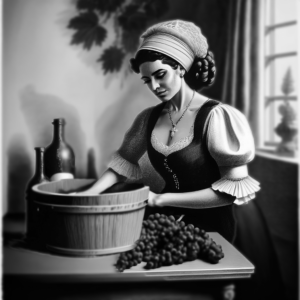
Nevada's silver boomtown, Tonopah, wasn't just about riches. it was riddled with a silent killer. silicosis. This lung disease ravaged miners, leaving a trail of widows and shattered dreams. But Tonopah wasn't a town to surrender. The community rallied, offering support to those left behind. Many women turned to running boarding houses, a natural fit for survival. But one widow refused to be defined by tragedy. We’re talking about a strong woman who did it a little differently.
TRANSCRIPT
Tonopah thrived amidst the harsh realities of mining life. Yet, alongside the promise of wealth laid something deadly, silicosis, a lung disease caused by inhaling silica dust. As the mines prospered, cases of silicosis rose, claiming the lives of many miners and leaving behind a community forever changed.
The impact was stark. Tonopah became a town marked by sorrow, with a disproportionate number of widows struggling to make ends meet and raise their families alone. Faced with a brutal choice, leave or endure, many women of Tonopah chose resilience.
Those who stayed forged bonds of support, sharing what little they had to survive the tough times that followed the mid-1920s economic downturn. Imagine a town where single miners outnumbered married men, and resourceful widows became the backbone of survival. Boarding houses sprung up, providing a haven for transient miners seeking shelter and community.
One such widow, Miruna Banovich, found herself thrust into a unique opportunity after losing her husband to silicosis in 1921. Initially running a boarding house like many others, fate intervened with an unexpected twist, a chance business venture with a grape wholesaler.
But there was a catch, Prohibition was in full force across America, banning the sale and production of alcohol. Undeterred by the law, Miruna saw potential where others saw restriction. She began producing wine clandestinely, leveraging her boarding house to distribute and even bottle the illicit brew.
The secret to Miruna's success lay hidden beneath the floorboards of her smokehouse, a covert distillery. Operating under the watchful eyes of Prohibition officers, known locally as "Pro-HIs," Miruna navigated the risks with remarkable finesse. Somehow, she always seemed to receive advance notice of impending raids, thanks to a network of supporters and a keen community watch.
Miruna's ingenuity and the unwavering support of Tonopah's residents enabled her to defy Prohibition and carve out a new life amidst adversity. Her story, one of resilience and entrepreneurial spirit, echoed through the mining town's dusty streets.
Miruna Banovich's daring venture begs the question: Did her success inspire other widows in Tonopah to pursue their own unconventional paths to survival? What other hidden talents and entrepreneurial endeavors did Prohibition unearth?
In the remarkable community of Tonopah, hardship was met with determination. It was also met with fermented grapes that fueled a spirit of defiance.
Also check out:
Tonopah: The Greatest, the Richest, and the Best Mining Camp in the World. Robert D. McCracken. Pages 47-48.
Check out our full podcast archive here.


